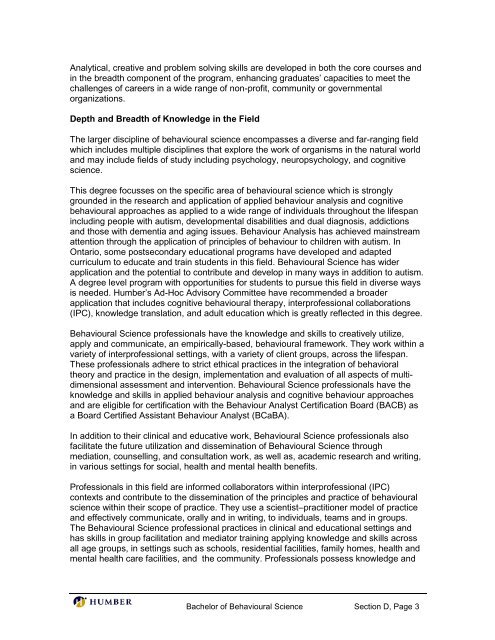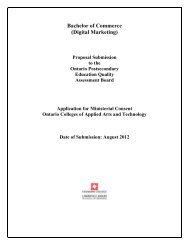Bachelor of Behavioural Science - Postsecondary Education Quality ...
Bachelor of Behavioural Science - Postsecondary Education Quality ...
Bachelor of Behavioural Science - Postsecondary Education Quality ...
Create successful ePaper yourself
Turn your PDF publications into a flip-book with our unique Google optimized e-Paper software.
Analytical, creative and problem solving skills are developed in both the core courses and<br />
in the breadth component <strong>of</strong> the program, enhancing graduates‘ capacities to meet the<br />
challenges <strong>of</strong> careers in a wide range <strong>of</strong> non-pr<strong>of</strong>it, community or governmental<br />
organizations.<br />
Depth and Breadth <strong>of</strong> Knowledge in the Field<br />
The larger discipline <strong>of</strong> behavioural science encompasses a diverse and far-ranging field<br />
which includes multiple disciplines that explore the work <strong>of</strong> organisms in the natural world<br />
and may include fields <strong>of</strong> study including psychology, neuropsychology, and cognitive<br />
science.<br />
This degree focusses on the specific area <strong>of</strong> behavioural science which is strongly<br />
grounded in the research and application <strong>of</strong> applied behaviour analysis and cognitive<br />
behavioural approaches as applied to a wide range <strong>of</strong> individuals throughout the lifespan<br />
including people with autism, developmental disabilities and dual diagnosis, addictions<br />
and those with dementia and aging issues. Behaviour Analysis has achieved mainstream<br />
attention through the application <strong>of</strong> principles <strong>of</strong> behaviour to children with autism. In<br />
Ontario, some postsecondary educational programs have developed and adapted<br />
curriculum to educate and train students in this field. <strong>Behavioural</strong> <strong>Science</strong> has wider<br />
application and the potential to contribute and develop in many ways in addition to autism.<br />
A degree level program with opportunities for students to pursue this field in diverse ways<br />
is needed. Humber‘s Ad-Hoc Advisory Committee have recommended a broader<br />
application that includes cognitive behavioural therapy, interpr<strong>of</strong>essional collaborations<br />
(IPC), knowledge translation, and adult education which is greatly reflected in this degree.<br />
<strong>Behavioural</strong> <strong>Science</strong> pr<strong>of</strong>essionals have the knowledge and skills to creatively utilize,<br />
apply and communicate, an empirically-based, behavioural framework. They work within a<br />
variety <strong>of</strong> interpr<strong>of</strong>essional settings, with a variety <strong>of</strong> client groups, across the lifespan.<br />
These pr<strong>of</strong>essionals adhere to strict ethical practices in the integration <strong>of</strong> behavioral<br />
theory and practice in the design, implementation and evaluation <strong>of</strong> all aspects <strong>of</strong> multidimensional<br />
assessment and intervention. <strong>Behavioural</strong> <strong>Science</strong> pr<strong>of</strong>essionals have the<br />
knowledge and skills in applied behaviour analysis and cognitive behaviour approaches<br />
and are eligible for certification with the Behaviour Analyst Certification Board (BACB) as<br />
a Board Certified Assistant Behaviour Analyst (BCaBA).<br />
In addition to their clinical and educative work, <strong>Behavioural</strong> <strong>Science</strong> pr<strong>of</strong>essionals also<br />
facilitate the future utilization and dissemination <strong>of</strong> <strong>Behavioural</strong> <strong>Science</strong> through<br />
mediation, counselling, and consultation work, as well as, academic research and writing,<br />
in various settings for social, health and mental health benefits.<br />
Pr<strong>of</strong>essionals in this field are informed collaborators within interpr<strong>of</strong>essional (IPC)<br />
contexts and contribute to the dissemination <strong>of</strong> the principles and practice <strong>of</strong> behavioural<br />
science within their scope <strong>of</strong> practice. They use a scientist–practitioner model <strong>of</strong> practice<br />
and effectively communicate, orally and in writing, to individuals, teams and in groups.<br />
The <strong>Behavioural</strong> <strong>Science</strong> pr<strong>of</strong>essional practices in clinical and educational settings and<br />
has skills in group facilitation and mediator training applying knowledge and skills across<br />
all age groups, in settings such as schools, residential facilities, family homes, health and<br />
mental health care facilities, and the community. Pr<strong>of</strong>essionals possess knowledge and<br />
<strong>Bachelor</strong> <strong>of</strong> <strong>Behavioural</strong> <strong>Science</strong> Section D, Page 3
















